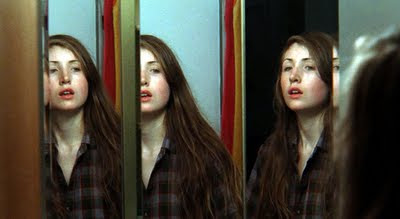 |
| A scene from I Love Being Me, Don't You. Photo credit: Steven Gunther. |
Unleashed downtown
By Ed Rampell
If you love your humor hurled like a drone missile and dripping with irony, then head on down to the REDCAT to achieve your sarcasm orgasm at Sandra Bernhard’s I Love Being Me, Don’t You?
When I entered the sold-out theater, along with around 300 other intrepid souls, I was perplexed to see the otherwise bare stage setup for a concert, and didn’t know what to expect: A) A standup routine? B) A one woman show? Or: C) Was Madonna’s onetime gal pal (and lord knows what else) presenting a musical performance?
The answer is: D) All of the above – and then some. Yes, the now 50-something bad girl of comedy did open the evening with a song and went on to perform a variety of pop numbers, accompanied by a melodious backup band -- and an African-American crooner whom Bernhard quipped was her “black-up singer.” However about 60 percent of her act remained spoken comedy, served with Bernhard’s signature slice-and-dice-anything-but-nice brand of scathing humor.
Nothing escapes Bernhard’s scorching gaze and no vapidity, shibboleth, sacred cow (or bull) and social pretense is safe from her withering wit, which could curdle the milk of human not so kindness. Onstage she mockingly reads ads with gusto, reaming consumerism a new one. The wag lampoons The New York Times and harpoons celebrities, from Iman to Bristol Palin (don’t expect to see our gal Sandy Dancing With the Stars any time soon). To her audience’s delight, the openly lesbian Bernhard holds forth on the superiority of gays over straights, insisting that homosexuals have more disposable income, fashion sense and so on than their poor misbegotten, downtrodden hetero counterparts. A sort of latter day Oscar Wilde, Bernhard is proof positive that the love that once dared not speak its name can no longer be shut up.
Bernhard gets away with this because -- like those court jesters of yore who mocked the royals -- she’s high-lariously funny (even if many of the laughs may stick in your craw). Although she’s the sworn enemy of societal hypocrisy heaping scorn upon pretentiousness, pomposity and the like, Bernhard doesn’t spare her own self from her razor sharp, acid-dipped tongue. In fact, Bernhard is one of her favorite targets, and her hilariously bad singing not only deconstructs rock music but spoofs her own persona and pretention that she has anything remotely resembling musical ability. The only thing this lady has in common with Mick Jagger, for instance, are mile long pouting lips -- certainly not any singing talent. By poking fun at herself, Bernhard gets away with ridiculing those who are no longer high and mighty after they undergo the Bernhard treatment.
I Love Being Me, Don’t You? includes guest performers, and on opening night the diva of rock and droll was joined onstage by Leisha Hailey, who’d co-starred as the outspoken gay rights advocate Alice on Showtime’s The L Word (which Bernhard had a recurring role on) and sang a spirited duet with Bernhard. (Not coincidentally, Hailey is reminiscent of a younger Bernhard.) Other guest stars are expected to make special appearances during the run of the show.
Onstage Bernhard appeared rather tall in her heels and was looking good, although she cracked wise about surgical procedures she may (or may not have) undergone. At her debut show she wore a sexy dress with see-through slits that seemed to reveal that the only thing she was wearing beneath the glittery gown was a thong, which Bernhard joked at one point was responsible for her moodiness (use your own fertile imagination, dear reader). Her flesh seemed minus any body tone, although the thought of her working out at a fitness center conjures up visions of sheer hilarity. And of course, with those exaggerated elastic features, Sandra has a punim made for comedy.
Bernhard and her unique brand of Don Rickles-on-steroids humor isn’t everybody’s cup of hemlock. But for those who enjoy the puncturing of balloons of bombast, self-importance and arrogance, and the treating of those suffering from delusions of grandeur with comical derision, get thee to the REDCAT for a yuk-a-minute laugh-a-thon. (Earplugs optional.)
Sandra Bernhard: I Love Being Me, Don’t You? runs through Aug. 21 at the REDCAT, 231 W. 2nd St., L.A., CA 90012. For more info: (213)237-2800; www.redcat.org



